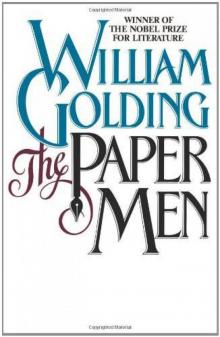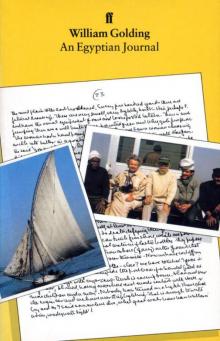- Home
- William Golding
To the Ends of the Earth Page 12
To the Ends of the Earth Read online
Page 12
Yet I was warmed by Summers’s belief in my ability and more by his confident appeal to my sense of justice. What creatures we are! Here was I, who only a few weeks before had thought highly of myself because my mother wept to see me go, now warming my hands at the small fire of a lieutenant’s approval!
However, at last I saw how to go on.
(61)
Well! I returned to my hutch, washed, shaved and dressed with care. I took my morning draught in the saloon and then drew myself up as before a regular stitcher. I did not enjoy the prospect of the interview, I can tell you! For if I had established my position in the ship, it was even more evident that the captain had established his! He was indeed our moghool. To remove my foreboding I went very briskly to the quarterdeck, positively bounding up the ladders. Captain Anderson, the wind now being on the starboard quarter, was standing there and facing into it. This is his privilege; and is said by seamen to rise from the arcane suggestion that “Danger lies to windward” though in the next breath they will assure you that the most dangerous thing in the world is “a lee shore”. The first, I suppose, refers to a possible enemy ship, the second to reefs and suchlike natural hazards. Yet I have, I believe, a more penetrating suggestion to make as to the origin of the captain’s privilege. Whatever sector of the ship is to windward is almost free from the stench she carries everywhere with her. I do not mean the stink of urine and ordure but that pervasive stench from the carcass of the ship herself and her rotten bilge of gravel and sand. Perhaps more modern ships with their iron ballast may smell more sweetly; but captains, I dare say, in this Noah’s service will continue to walk the windward side even if ships should run clean out of wind and take to rowing. The tyrant must live as free of stink as possible.
I find that without conscious intention I have delayed this description as I had dallied over my draught. I live again those moments when I drew myself together for the jump!
Well then, I stationed myself on the opposite side of the quarterdeck, affecting to take no notice of the man other than to salute him casually with a lifted finger. My hope was that his recent gaiety and elevation of spirits would lead him to address me first. My judgement was correct. His new air of satisfaction was indeed apparent, for when he saw me he came across, his yellow teeth showing.
“A fine day for you, Mr Talbot!”
“Indeed it is, sir. Do we make as much progress as is common in these latitudes?”
“I doubt that we shall achieve more than an average of a knot over the next day or two.”
“Twenty-four sea miles a day.”
“Just so, sir. Warships are generally slower in their advance than most people suppose.”
“Well sir, I must confess to finding these latitudes more agreeable than any I have experienced. Could we but tow the British Isles to this part of the world, how many of our social problems would be solved! The mango would fall in our mouths.”
“You have a quaint fancy there, sir. Do you mean to include Ireland?”
“No sir. I would offer her to the United States of America, sir.”
“Let them have the first refusal, eh, Mr Talbot?”
“Hibernia would lie snugly enough alongside New England. We should see what we should see!”
“It would remove half a watch of my crew at a blow.”
“Well worth the loss, sir. What a noble prospect the ocean is under a low sun! Only when the sun is high does the sea seem to lack that indefinable air of Painted Art which we are able to observe at sunrise and sunset.”
“I am so accustomed to the sight that I do not see it. Indeed, I am grateful—if the phrase is not meaningless in the circumstances—to the oceans for another quality.”
“And that is?”
“Their power of isolating a man from his fellows.”
“Of isolating a captain, sir. The rest of humanity at sea must live only too much herded. The effect on them is not of the best. Circe’s task must not have been hindered, to say the least, by the profession of her victims!”
Directly I had said this I realized how cutting it might sound. But I saw by the blankness of the captain’s face, then its frown, that he was trying to remember what had happened to any ship of that name.
“Herded?”
“Packed together, I ought to have said. But how balmy the air is! I declare it seems almost insupportable that I must descend again and busy myself with my journal.”
Captain Anderson checked at the word “journal” as if he had trodden on a stone. I affected not to notice but continued cheerfully.
“It is partly an amusement, captain, and partly a duty. It is, I suppose, what you would call a ‘log’.”
“You must find little to record in such a situation as this.”
“Indeed, sir, you are mistaken. I have not time nor paper sufficient to record all the interesting events and personages of the voyage together with my own observations on them. Look—there is Mr Prettiman! A personage for you! His opinions are notorious, are they not?”
But Captain Anderson was still staring at me.
“Personages?”
“You must know,” said I laughing, “that had I not his lordship’s direct instructions to me I should still have been scribbling. It is my ambition to out-Gibbon Mr Gibbon and this gift to a godfather falls conveniently.”
Our tyrant was pleased to smile, but quiveringly, like a man who knows that to have a tooth pulled is less painful than to have the exquisite torturer left in.
“We may all be famous, then,” said he. “I had not looked for it.”
“That is for the future. You must know, sir, that to the unhappiness of us all, his lordship has found himself temporarily vexed by the gout. It is my hope that in such a disagreeable situation, a frank, though private account of my travels and of the society in which I find myself may afford him some diversion.”
Captain Anderson took an abrupt turn up and down the deck, then stood directly before me.
“The officers of the ship in which you travel must bulk large in such an account.”
“They are objects of a landsman’s interest and curiosity.”
“The captain particularly so?”
“You sir? I had not considered that. But you are, after all, the king or emperor of our floating society with prerogatives of justice and mercy. Yes. I suppose you do bulk large in my journal and will continue to do so.”
Captain Anderson turned on his heel and marched away. He kept his back to me and stared up wind. I saw that his head was sunk again, his hands clasped behind his back. I supposed that his jaw must be projecting once more as a foundation on which to sink the sullenness of his face. There was no doubt at all of the effect of my words, either on him or on me! For I found myself quivering as the first lieutenant had quivered when he dared to beard Mr Edmund Talbot! I spoke, I know not what, to Cumbershum, who had the watch. He was discomforted, for it was clean against the tyrant’s Standing Orders and I saw, out of the corner of my eye, how the captain’s hands tightened on each other behind his back. It was not a situation that should be prolonged. I bade the lieutenant good day and descended from the quarterdeck. I was glad enough to get back into my hutch, where I found of all things that my hands still had a tendency to tremble! I sat, therefore, getting my breath back and allowing my pulse to slow.
At length I began to consider the captain once more and try to predict his possible course of action. Does not the operation of a statist lie wholly in his power to affect the future of other people; and is not that power founded directly on his ability to predict their behaviour? Here, thought I, was the chance to observe the success or failure of my prentice hand! How would the man respond to the hint I had given him! It was not a subtle one; but then, I thought, from the directness of his questions that he was a simple creature at bottom. It was possible that he had not noticed the suggestiveness of my mentioning Mr Prettiman and his extreme beliefs! Yet I felt certain that mention of my journal would force him to look back over t
he whole length of the voyage and consider what sort of figure he might cut in an account of it. Sooner or later he would stub his toe over the Colley affair and remember how he had treated the man. He must see that however I myself had provoked him, nevertheless, by indulging his animosity against Colley, he had been cruel and unjust.
How would he behave then? How had I behaved when Summers had revealed to me my portion of responsibility in the affair? I tried out a scene or two for our floating theatre. I pictured Anderson descending from the quarterdeck and walking in the lobby casually, so as not to seem interested in the man. He might well stand consulting his own fading Orders, written out in a fair and clerkly hand. Then at a convenient moment, no one being by—oh no! he would have to let it be seen so that I should record it in my journal!—he would march into the hutch where Colley lay, shut the door, sit by the bunk and chat till they were a couple of bosoms. Why, Anderson might well stand in for an archbishop or even His Majesty! How could Colley not be roused by such amiable condescension? The captain would confess that he himself had committed just such a folly a year or two before—
I could not imagine it, that is the plain truth. The conceit remained artificial. Such behaviour was beyond Anderson. He might, he might just come down and gentle Colley somewhat, admitting his own brusqueness but saying it was habitual in a captain of a ship. More likely he would come down but only to assure himself that Colley was lying in his bunk, prone and still and not to be roused by a jesting exordium. But then, he might not even come down. Who was I to dip into the nature of the man, cast the very waters of his soul and by that chirurgeonly experiment declare how his injustice would run its course? I sat before this journal, upbraiding myself for my folly in my attempt to play the politician and manipulator of his fellow men! I had to own that my knowledge of the springs of human action was still in the egg. Nor does a powerful intellect do more than assist in the matter. Something more there must be, some distillation of experience, before a man can judge the outcome in circumstances of such quantity, proliferation and confusion.
And then, then can your lordship guess? I have saved the sweet to the last! He did come down. Before my very eyes he came down as if my prediction had drawn him down like some fabulous spell! I am a wizard, am I not? Admit me to be a prentice-wizard at least! I had said he would come down and come down he did! Through my louvre I saw him come down, abrupt and grim, to take his stand in the centre of the lobby. He stared at one hutch after another, turning on his heel, and I was only just in time to pull my face away from the spyhole before his louring gaze swept over it with an effect I could almost swear like the heat from a burning coal! When I risked peeping again—for somehow it seemed positively dangerous that the man should know I had seen him—he had his back to me. He stepped to the door of Colley’s hutch and for a long minute stared through it. I saw how one fist beat into the palm of the other hand behind his back. Then he swung impatiently to his left with a movement that seemed to cry out—I’ll be damned if I will! He stumped to the ladder and disappeared. A few seconds later I heard his firm step pass along the deck above my head.
This was a modified triumph, was it not? I had said he would come down and he had come down. But where I had pictured him endeavouring to comfort poor Colley he had shown himself either too heartless or too little politic to bring himself to do so. The nearer he had come to dissimulating his bile the higher it had risen in his throat. Yet now I had some grounds for confidence. His knowledge of the existence of this very journal would not let him be. It will be like a splinter under the nail. He would come down again—
BETA
Wrong again, Talbot! Learn another lesson, my boy! You fell at that fence! Never again must you lose yourself in the complacent contemplation of a first success! Captain Anderson did not come down. He sent a messenger. I was just writing the sentence about the splinter when there came a knock at the door and who should appear but Mr Summers! I bade him enter, sanded my page—imperfectly as you can see—closed and locked my journal, stood up and indicated my chair. He declined it, perched himself on the edge of my bunk, laid his cocked hat on it and looked thoughtfully at my journal.
“Locked, too!”
I said nothing but looked him in the eye, smiling slightly. He nodded as if he understood—which indeed I think he did.
“Mr Talbot, it cannot be allowed to continue.”
“My journal, you mean?”
He brushed the jest aside.
“I have looked in on the man by the captain’s orders.”
“Colley? I looked in on him myself. I agreed to, you remember.”
“The man’s reason is at stake.”
“All for a little drink. Is there still no change?”
“Phillips swears he has not moved for three days.”
I made a perhaps unnecessarily blasphemous rejoinder. Summers took no notice of it.
“I repeat, the man is losing his wits.”
“It does indeed seem so.”
“I am to do what I can, by the captain’s orders, and you are to assist me.”
“I?”
“Well. You are not ordered to assist me but I am ordered to invite your assistance and profit by your advice.”
“Upon my soul, the man is flattering me! Do you know, Summers, I was advised myself to practise the art! I little thought to find myself the object of such an exercise!”
“Captain Anderson feels that you have a social experience and awareness that may make your advice of value.”
I laughed heartily and Summers joined in.
“Come Summers! Captain Anderson never said that!”
“No, sir. Not precisely.”
“Not precisely indeed! I tell you what, Summers—”
I stopped myself in time. There were many things I felt like saying. I could have told him that Captain Anderson’s sudden concern for Mr Colley began not at any moment of appeal by me but at the moment when he heard that I kept a journal intended for influential eyes. I could have given my opinion that the captain cared nothing for Colley’s wits but sought cunningly enough to involve me in the events and so obscure the issue or at the very least soften what might well be your lordship’s acerbity and contempt. But I am learning, am I not? Before the words reached my tongue I understood how dangerous they might be to Summers—and even to me.
“Well, Mr Summers, I will do what I can.”
“I was sure you would agree. You are co-opted among us ignorant tars as the civil power. What is to be done?”
“Here we have a parson who—but come, should we not have co-opted Miss Granham? She is the daughter of a canon and might be presumed to know best how to handle the clergy!”
“Be serious, sir and leave her to Mr Prettiman.”
“No! It cannot be! Minerva herself?”
“Mr Colley must claim all our attention.”
“Well then. Here we have a clergyman who—made too much of a beast of himself and refines desperately upon it.”
Summers regarded me closely, and I may say curiously.
“You know what a beast he made of himself?”
“Man! I saw him! We all saw him, including the ladies! Indeed, I tell you Summers, I saw something more than the rest!”
“You interest me deeply.”
“It is of little enough moment. But some few hours after his exhibition I saw him wander through the lobby towards the bog, a sheet of paper in his hand and for what it is worth a most extraordinary smile on that ugly mug of his.”
“What did the smile suggest to you?”
“He was silly drunk.”
Summers nodded towards the forward part of the vessel.
“And there? In the fo’castle?”
“How can we tell?”
“We might ask.”
“Is that wise, Summers? Was not the play-acting of the common people—forgive me!—directed not to themselves but to those in authority over them? Should you not avoid reminding them of it?”
“It
is the man’s wits, sir. Something must be risked. Who set him on? Beside the common people there are the emigrants, decent as far as I have met them. They have no wish to mock at authority. Yet they must know as much as anyone.”
Suddenly I remembered the poor girl and her emaciated face where a shadow lived and was, as it were, feeding where it inhabited. She must have had Colley’s beastliness exhibited before her at a time when she had a right to expect a far different appearance from a clergyman!
“But this is terrible, Summers! The man should be—”
“What is past cannot be helped, sir. But I say again it is the man’s wits that stand in danger. For God’s sake, make one more effort to rouse him from his, his—lethargy!”
“Very well. For the second time, then. Come.”

 Lord of the Flies
Lord of the Flies To the Ends of the Earth
To the Ends of the Earth Free Fall
Free Fall The Paper Men
The Paper Men The Spire
The Spire The Scorpion God: Three Short Novels
The Scorpion God: Three Short Novels The Inheritors
The Inheritors Darkness Visible: With an Introduction by Philip Hensher
Darkness Visible: With an Introduction by Philip Hensher Pincher Martin
Pincher Martin The Pyramid
The Pyramid The Double Tongue
The Double Tongue An Egyptian Journal
An Egyptian Journal Rites of Passage
Rites of Passage Envoy Extraordinary
Envoy Extraordinary